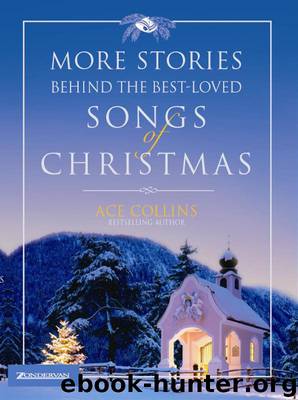More Stories Behind the Best-Loved Songs of Christmas by Ace Collins

Author:Ace Collins [Collins, Ace]
Language: eng
Format: epub
Publisher: ZONDERVAN
Published: 2015-12-24T16:00:00+00:00
17
THE WASSAIL SONG
The custom of wassailing goes back at least to medieval times. A few historians have even traced parts of this ancient custom and the song to the fifth century. T This makes “The Wassail Song” perhaps the very oldest carol still sung today. To put this custom and song’s age into perspective, Christmas cards are about a century and a half old, and “Silent Night” was penned less than two hundred years ago, yet the Knights of the Round Table surely heard wassail-ers. By the 1500s the tradition was so common that Shakespeare probably had children stop at his door and sing this song. Walter Drake and Isaac Newton also must have heard the strains of the little one’s hopeful voices at their gates. So the roots of “The Wassail Song” run deep, and though today it conjures up thoughts of a happy Christmas filled with good wishes and cheer, in a very real sense this song was born out of despair and great need. And underneath the happy lyrics and quaint custom is a lesson that is as important today as it was a millennium ago.
In a way, wassailing was a forerunner of caroling. Today, in certain parts of England, it is still practiced. Yet while many can sing at least one verse of the wassail carol, few actually know anything about the ancient holiday tradition that spawned the song. If carolers understood the story behind the song, they might more readily note the plight of many around them who still have few blessings to count during the Christmas season.
There are several theories as to when and why wassailing began, and while some believe the original wassailers were either single women or poor farmers, wassailing eventually grew into a tradition embracing children. In the days leading up to December 25, families who were desperately poor would decorate a large wooden bowl with colorful paint, garland, and ribbons. On Christmas Eve the families would send their children out with this bowl, usually filled with spirits, and the children would sing at the doors of the region’s wealthier people. Conjuring up a Christmas card image, the custom now seems quaint, but in reality wassailing presented a picture of society that was anything but picturesque.
In old England there was a great division between the rich and the poor. The wealthy controlled not only the money but the shops, goods, and job opportunities. Essentially they were also the voice of the law in their area. The wealthy were born to privilege; by birthright they had been given the power, and there was no way to take it from them. Those without title were doomed to serve, scraping by but never getting ahead. During the winter, the children of destitute families were often hungry, cold, and poorly clothed. These waifs, as they were called, were looked at with great disdain by many members of English society.
By the sixteenth century, the Dark Ages may have been officially over, but the sun seemed to rarely shine on the poor.
Download
This site does not store any files on its server. We only index and link to content provided by other sites. Please contact the content providers to delete copyright contents if any and email us, we'll remove relevant links or contents immediately.
| Christmas | Easter & Lent |
The 5 Love Languages: The Secret to Love That Lasts by Gary Chapman(9792)
The Space Between by Michelle L. Teichman(6929)
Assassin’s Fate by Robin Hobb(6200)
Wiseguy by Nicholas Pileggi(5770)
Everything Happens for a Reason by Kate Bowler(4734)
Gerald's Game by Stephen King(4642)
Pillow Thoughts by Courtney Peppernell(4271)
A Simplified Life by Emily Ley(4158)
The Power of Positive Thinking by Norman Vincent Peale(4062)
Harry Potter and the Prisoner of Azkaban (Book 3) by J. K. Rowling(3350)
Resisting Happiness by Matthew Kelly(3337)
Girl, Wash Your Face by Rachel Hollis(3282)
Being Aware of Being Aware by Rupert Spira(3272)
The Secret Power of Speaking God's Word by Joyce Meyer(3182)
The Code Book by Simon Singh(3180)
More Language of Letting Go: 366 New Daily Meditations by Melody Beattie(3024)
Real Sex by Lauren F. Winner(3014)
Name Book, The: Over 10,000 Names--Their Meanings, Origins, and Spiritual Significance by Astoria Dorothy(2979)
The Holy Spirit by Billy Graham(2944)
